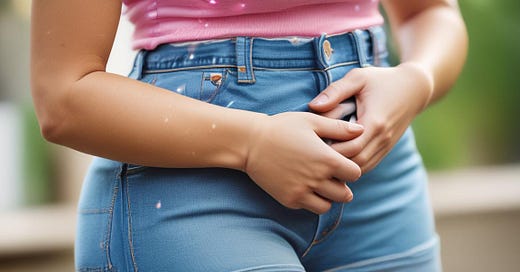My best friend Kay and her mom were in town earlier this week, and my husband and I met them for dinner.
As we were catching up, they asked me how I was feeling. In case you didn't know, I've had numerous medical issues over the past couple of years, with lipedema being just one of them. However, I've been feeling pretty good over the past three months, and I told them so.
Then they asked me the question. The one that many people ask, “What is lipedema?
That can be an overwhelming question. Where do you start to explain the intricacies of lipedema?
I gave my lipedema spiel, explaining all the signs and symptoms, and I think they understood. But then they asked, which in summary was, 'How is it different from regular fat?
It’s a great question. How do you know it’s lipedema fat and not regular fat? Well, there is one major thing that separates lipedema fat from regular fat.
Lipedema fat hurts! Regular fat does not.
Painful fat deposits make lipedema different from ordinary body fat, which doesn't hurt.
While all published guidelines mention pain as a possible symptom, none require it for a lipedema diagnosis (if you’re interested, you can view a list of comparable diagnostic criteria here).
However, research indicates that up to 92% of women with lipedema experience pain, with more than half describing their pain as severe or extremely severe. The more advanced the disease, the more intense the pain a woman is likely to experience.
But pain in lipedema can feel different from a typical 'ouch.' Some women might not realize their fat is causing pain because it often manifests as a sense of heaviness, aching legs, or a feeling of swelling or bloating. The pain might also present as fatigue, irritability, depression, or a lack of motivation. With this disease, pain can develop gradually, and you might not become aware of it until someone points it out.
I had this experience. I didn’t know my fat hurt until my diagnosing physician started pressing and poking my thighs. I remember yelling out, “Ow, that hurts!” while at the same time being surprised by the pain. Before that, I thought my heavy and achy legs were from venous insufficiency, as I was told.
This is why it’s crucial to get a proper diagnosis, seek conservative care, and, if necessary, consider liposuction surgery. Effectively managing this disease helps slow its progression and optimize functional health. By managing our health, we can live a full, active life.
Living with lipedema can be challenging, but your body is resilient and carries you through each day despite the struggles it faces. Embrace it with kindness and care, honoring its strength and beauty. Nourish it with the time, attention, and self-care it needs.
By taking care of your body and showing it love, you can build a sense of self-compassion that helps you cope with any illness. Remember, you are more than your condition—you are strong and beautiful.
Take care,
Michelle





